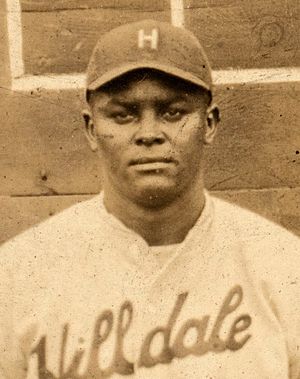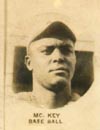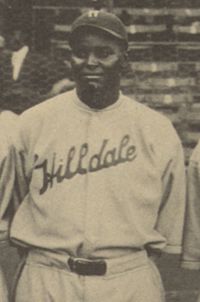Biz Mackey facts for kids
Quick facts for kids Biz Mackey |
|||
|---|---|---|---|

Mackey in 1924
|
|||
| Catcher | |||
| Born: July 27, 1897 Eagle Pass, Texas |
|||
| Died: September 22, 1965 (aged 68) Los Angeles, California |
|||
|
|||
| debut | |||
| 1918, for the San Antonio Black Aces | |||
| Last appearance | |||
| 1950, for the Newark Eagles | |||
| Career statistics | |||
| Batting average | .328 | ||
| Hits | 1,008 | ||
| Runs batted in | 603 | ||
| Home runs | 52 | ||
| Managerial record | 186–143–9 | ||
| Teams | |||
|
|||
| Career highlights and awards | |||
|
|||
| Induction | 2006 | ||
| Election Method | Negro League Committee | ||
James Raleigh "Biz" Mackey (born July 27, 1897 – died September 22, 1965) was a famous American catcher and manager in Negro league baseball. He played for many teams, including the Indianapolis ABCs, Hilldale Daisies, Philadelphia Stars, and Newark Eagles.
Biz Mackey was known as one of the best catchers in black baseball during the late 1920s and early 1930s. He was great at defense and had a very strong arm for throwing. He was also an excellent batter, hitting over .300 for his career. This means he got a hit more than 30% of the times he tried! In 2006, Biz Mackey was honored by being chosen for the National Baseball Hall of Fame.
Contents
Biz Mackey's Baseball Journey
Early Life and Start in Baseball
Biz Mackey was born in Eagle Pass, Texas. His family worked as sharecroppers, which meant they farmed land owned by someone else. He started playing baseball with his brothers in 1916 for a local team called the Luling Oilers.
Two years later, in 1918, he became a professional player with the San Antonio Black Aces. When that team closed in 1920, Mackey joined the Indianapolis ABCs. This was just in time for the first season of the Negro National League.
Becoming a Star Catcher
Mackey played three years with the Indianapolis ABCs. He was a great hitter, with batting averages of .315, .317, and .344. In 1923, he joined the Hilldale team when the Eastern Colored League was formed.
In his first year with Hilldale, Mackey hit an amazing .423! This made him the batting champion of the Eastern Colored League. He helped his team win the pennant, which is like winning their league. For the next eight seasons, he continued to hit very well, always above .308.
In 1924, Hilldale won the championship again. But they lost to the Kansas City Monarchs in the first Negro League World Series. Mackey played third base in that series. In 1925, he became the full-time catcher for Hilldale. He helped them win the Negro League World Series against the Monarchs that year. He hit .360 in the series and made many important plays.
Playing Around the World
Biz Mackey also traveled to play baseball in other countries. In 1927, he went to Japan. He was the first player to hit a home run out of Meiji Shrine Stadium, hitting three in a row! People in Japan really liked him. He went back to Japan in 1934 and 1935.
In 1931, he won his second batting title, hitting .359. His Hilldale team also had the best record among the eastern teams that year.
All-Star Games and Mentoring Young Players
In 1933, Mackey was chosen to play in the very first East–West All-Star Game. This was a big honor, and he was picked as the catcher. He played in three more All-Star Games by 1938.
In 1934, his team, the Philadelphia Stars, won their league's second-half pennant. Mackey played well in the postseason, hitting .368. He helped his team win the championship against the Chicago American Giants.
By 1937, Mackey was managing the Baltimore Elite Giants. He started teaching a young 15-year-old player named Roy Campanella how to be a great catcher. Campanella later became a Hall of Famer himself. He said that Biz Mackey was the best defensive catcher he ever saw. He learned a lot from watching Mackey, like how to block pitches and throw quickly.
Mackey joined the Newark Eagles in 1939. A year later, he became their manager. He continued to help young players like Monte Irvin, Larry Doby, and Don Newcombe. These players also became very famous in baseball. When Larry Doby joined the Cleveland Indians in 1947, Mackey suggested he move from second base to center field. This was a great idea!
Later Career and Retirement
Mackey left playing baseball after the 1941 season. But he came back in 1945. In 1946, he managed the Newark Eagles to win the Negro League World Series. They beat the Kansas City Monarchs, who had the famous pitcher Satchel Paige. Even in his 40s, Mackey was still a good player. He hit .307 in 1945 and played in the All-Star Game in 1947, when he was 50 years old! When the Eagles team moved to Houston in 1950, he decided to retire from baseball.
Life After Baseball and Hall of Fame
In the 1950s, Biz Mackey moved to Los Angeles. He worked as a forklift operator. In 1952, a newspaper poll named him the greatest catcher in the Negro leagues, even better than Josh Gibson.
On May 7, 1959, Mackey was honored at a special event for Roy Campanella. Campanella had been in a car accident. Mackey was introduced to a huge crowd of over 93,000 people at the Los Angeles Memorial Coliseum.
Biz Mackey lived in Los Angeles until he passed away in 1965. He is buried in Evergreen Cemetery in that city. In 2006, Biz Mackey was finally elected into the National Baseball Hall of Fame. His grandson, Riley Odoms, later played professional football for the National Football League's Denver Broncos.
Images for kids
 | Percy Lavon Julian |
 | Katherine Johnson |
 | George Washington Carver |
 | Annie Easley |






